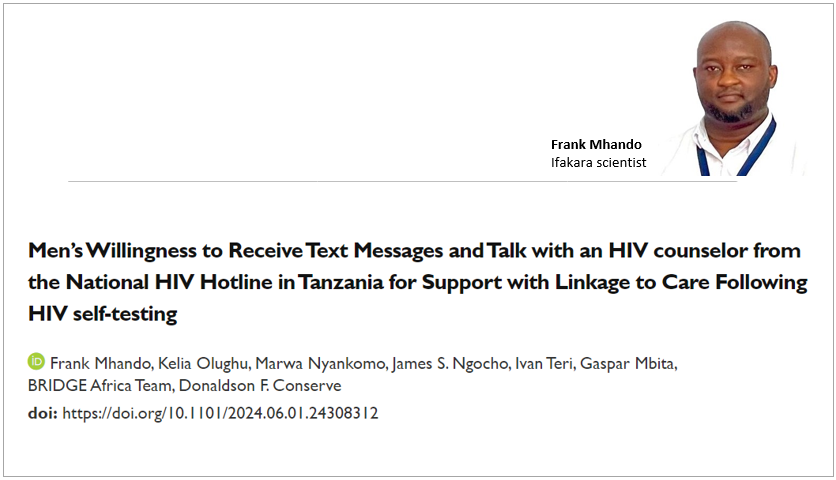
HIV: Enhancing testing and care linkage using mobile technology

The use of mobile technology and digital health interventions to improve HIV testing and linkage to care has been underscored after a recent study conducted in Tanzania showed a strong acceptance and openness among peers in discussing HIV-related topics via text.
This underscores the significant potential of mobile health (mHealth) tools in improving HIV prevention and care efforts, particularly in resource-limited settings.
Tanzania faces significant challenges in addressing its HIV burden, particularly in reaching men and ensuring timely linkage to care. To address these issues, initiatives like HIV self-testing (HIVST) have been introduced to increase testing rates, while the National HIV Hotline is being considered as a tool to facilitate linkage to care.
Tanzanian men's willingness to receive support
The study aimed to evaluate Tanzanian men's willingness to receive support (counseling) from the National HIV Hotline via mobile phones with linkage to care following HIV self-testing (HIVST).
According to the scientists, the study findings, published in the medRxiv journal, contribute “to the growing body of evidence on the feasibility and acceptability of the National HIV Hotlines for HIV testing and linkage to care in resource-limited settings.”
They emphasized, "By addressing barriers to HIV service uptake and leveraging digital health technologies, we can advance HIV prevention and care efforts and work towards achieving the goals of HIV epidemic control.”
Hundreds of men involved in a survey
A survey was conducted in June 2019 as part of a cluster-randomized controlled trial involving 18 social networks or "camps" in Dar es Salaam, Tanzania. The study surveyed 505 heterosexual men aged 18 and older who were HIV-negative at the time of enrollment.
Several factors associated with men's comfort in talking to an HIV counselor over the phone were assessed. The analysis focused on variables such as comfort with texting a friend about HIV self-testing, comfort with texting a friend about HIV, and previous exposure to HIV-related text messages.
Enhancing mHealth via widespread mobile phone access
Results showed that a vast majority of participants (98%) reported having access to mobile phones, suggesting a strong foundation for utilizing mHealth interventions, such as text messaging, which could be an effective tool for HIV-related communication and support in Tanzania.
The high level of mobile phone ownership, even in regions with limited traditional healthcare infrastructure, suggests that digital health technologies could effectively reach remote and underserved populations with vital healthcare information and services.
Comfort with HIV counseling through hotlines
Regarding the comfortability in engaging with HIV counseling services, the study showed that participants who had previously received HIV-related text messages were more likely to feel comfortable talking to an HIV counselor on the National HIV Hotline after self-testing. This finding highlights the importance of prior exposure to HIV-related information in enhancing individuals' comfort levels when seeking HIV counseling services.
Role of peer support in HIV care
The study also highlighted the importance of peer support networks in HIV care, with a significant majority of participants (82.77%) expressing comfort in discussing HIVST with friends via text.
This underscores the critical role of peer support networks in HIV prevention and care. Peer influence has long been recognized as vital in effective HIV interventions, particularly in close-knit communities. Such support can help reduce the stigma associated with HIV, promote testing, and encourage linkage to care.
Tailored communication strategies recommended
Based on these findings, the scientists recommend tailored messaging and communication strategies to increase awareness and comfort in the uptake of HIV-related services, particularly among young men.
“The digital health interventions should aim to enhance comfort, address privacy concerns, and provide personalized support and information following HIV self-testing. By leveraging mobile technology and the National HIV Hotline, it is possible to improve HIV testing uptake and linkage to care among men in Tanzania.”
Moreover, they underscore that by leveraging peer/social networks, mHealth interventions can significantly contribute to reducing the stigma associated with HIV, promoting HIV testing uptake, and facilitating linkage to care.
The study also underscores several limitations, including its exclusive focus on male participants, which limits the broader applicability of the findings. Moving forward, the researchers recommend that future studies investigate the readiness of both sexual partners to use digital health interventions, aiming for a more comprehensive understanding of the impact of these interventions.
Ifakara scientist leads the study
The study was led by Ifakara Health Institute scientist, Frank Mhando with inputs from colleagues who include Kelia Olughu and Donaldson Conserve from George Washington University.
Other contributors include Marwa Nyankomo also from Ifakara, James Ngocho from Kilimanjaro Christian Medical University College (KCMC), Ivan Teri from the Elizabeth Glaser Pediatric AIDS Foundation, and Gaspar Mbita from Vrije Universiteit Amsterdam, along with the BRIDGE Africa Team.
Read the publication here.
